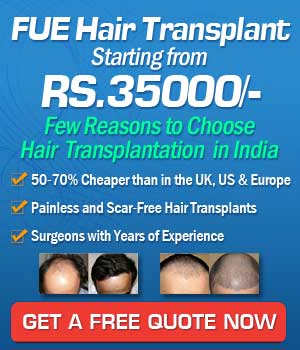Why Choose India for Hair Transplants?
The rising healthcare costs in the U.S have forced several patients
in the country to seek help from international destinations like India
where cheap medical services are available. The case is true especially
for orthopedic surgeries, cardiac surgeries, and cosmetic procedures
like hair transplants. Within a few years since the trend started, India
gained the status as a hot destination for medical tourism. The country
has been the favorite choice for many opting for affordable hair
restoration surgeries, which include the most advanced follicular unit
extraction (FUE).
For patients opting for hair transplant in
India, the country offers several benefits in terms of quality of
service and affordability. Let’s have a quick glance of the advantages
of getting hair transplant done in India.
Cost effective: Like
every other healthcare service, hair transplant procedure costs
significantly less in India when compared to Europe and America. Hair
transplant industry experts argue that hair transplant services in India
costs only 25 percent of that in the U.S. While in most part of the
U.S. a single follicular hair transplant costs between 3 to 8 U.S.
dollars, in India you may get the same for about 1 to 1.5 dollars.
English
Proficiency: Indians are well versed in English. Any foreigner from an
English speaking country will feel at home in India as they don’t face
the language barrier, especially while interacting with medical
professionals. Ensuring proper communication between patient and doctor
is vital in every medical procedure, including the cosmetic procedures
like hair transplant. Before starting the procedure, the hair surgeon
briefs the patient about the procedure so that he/she becomes fully
aware of its consequences. This communication helps build a rapport
between the patient and doctor bringing better results.
Qualified
Professionals: Medical professionals in India are well qualified to
serve different types of clients, including native and foreign. Many of
the well-known hospitals and hair transplant centers in India have hair
surgeons educated in foreign universities, so they are better equipped
to deal with foreign patients. Hair surgeons educated from local
universities too demonstrate high levels of standard because Indian
academic system is hailed as one of the best in the world.
Technology:
Hair transplant procedures like FUT (strip method) and FUE (follicular
method) are instrument-dependent procedures. These surgeries can be
performed only with the help of advanced equipment that consists of
microscopic lenses and sophisticated needles. Hair transplant centers in
India, especially those located in crowded cities like Mumbai, Delhi,
Bangalore and Hyderabad are equipped with the most advanced hair
transplant equipments in the industry.
Alternative Medicines:
India is known worldwide for the power of Ayurveda, yoga and
naturopathy. Several traditional treatments are available to treat
alopecia. These products include
Ayurvedic massage, oils, herbal
shampoos, and internal supplements. While getting the hair transplant
done you may also seek the advice of these local naturopaths to improve
the health of your future hair.
Tourism: Last but not the least,
India opens the door to a world of natural and historical wonders.
Visiting India for a hair transplant gives you an opportunity to touch
the land of the great Mogul Emperors and the famous Taj Mahal. It’s an
opportunity to unfold the wonderful geography, biodiversity, people,
culture, language and ethnicity of India. Don’t miss it.
HairFear
Frequently asked questions about hair transplant procedures
How much does a hair transplant cost?
Hair transplants can vary in price based off of the area in the world that you are interested in getting a hair transplant as well as the size of the area where you may need a hair transplant. Experienced doctors in the United States will often charge some of the highest prices for a hair transplant worldwide and this is why so many travelers make the move to other parts the world like Turkey, India, Thailand, Mexico...etc for their hair transplants.
Will a hair transplant hurt?
Although hair transplants may look like a particularly
unpleasant or painful experience is actually very little discomfort involved
with the surgery itself. Hair transplants are always done under an anesthetic so there's absolutely zero pain during the treatment itself. Many people actually relate the process as being very similar to going to the dentist for filling or root canal. Mild pain can persist over the course of postop treatment but he generally just resumes for a few days.
Who can deliver the best surgery?
It's usually best to consider working with surgeons who have and IAHRS certification or international alliance of hair restoration surgeons recognition. IAHRS can often deliver recommendations for the best surgeons in each particular area.
Is this scarring noticeable?
Any type of hair transplant will require the use of incisions throughout the scalp. There can also sometimes be a small scar from the donor area towards the back of the scalp. Asking to look at photos of the surgeon's previous work will help you to see roughly how bad the scarring could be. In most cases an experienced professional can limit the look of scarring and noticeable marks from the surgery.
How long does it take for the hair to grow?
In most cases hair growth will start within eight months and you can start to see a full effect from the hair transplant after a full year. The initial signs of growth can usually start between 3 to 4 months after the surgery.
Are the results permanent?
The hair follicles that are transplanted are generally the ones which are genetically resistant against the symptoms of baldness. As long as you receive hair loss treatment later in your life after the symptoms of balding have started to subside, you can have a better chance at permanent results.
While everyone know you've had surgery?
If you want to limit the chance that people may find out about your surgery it's important to give at least three weeks of healing as the surgical area will be affected and red just after surgery. After around a month of healing it can look far less noticeable. You could consider wearing a hat while time passes or opting for some extra time off if possible.
How long should I rest after surgery?
It's recommended to rest for at least a few days after surgery so that your body can recover. Trenton to over exert yourself and limit sexual activity, running in the gym for around 10 days after surgery.
Is it possible to lose more hair as a result of surgery?
There is always a chance of shock loss which happens when the hair is weak and miniaturizing after the surgery. As long as the surgeon is choosing the correct hair follicles and performing the surgery well it's possible to minimize the chance of this happening however.
Will I need another hair transplant?
The need for another transplant really depends on the individual. With a solid foundation surgery and working to potentially bolster results with drug therapy, you can improve the stability of the hair that was transplanted as well as prevent further loss. Getting a hair transplant early
on in your 20s or early on in life could lead to needing long-term transplants as hair loss can be progressive.







